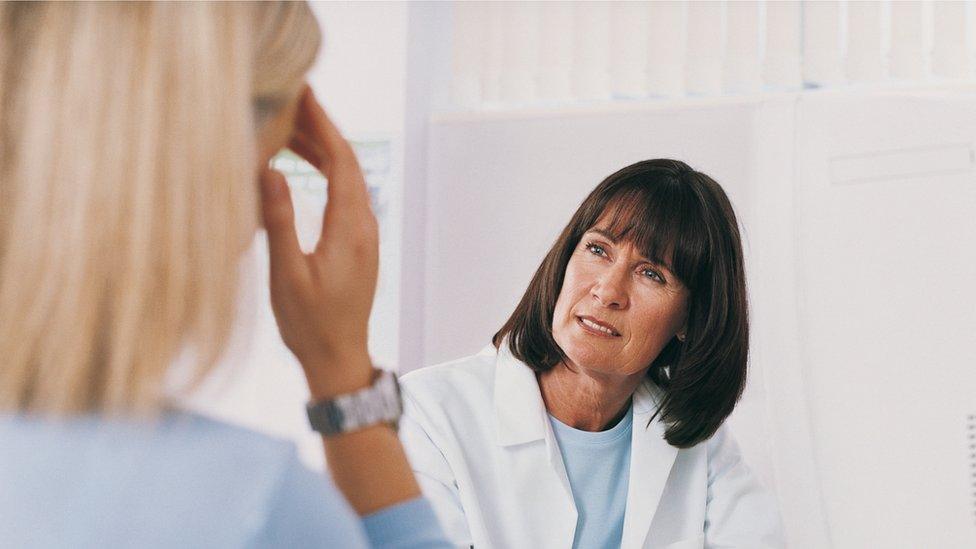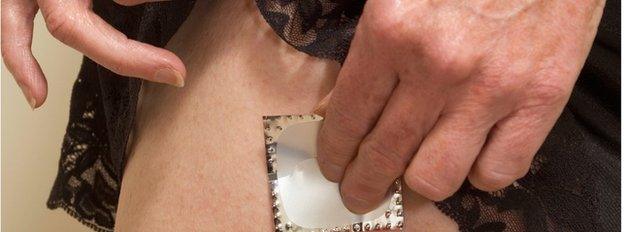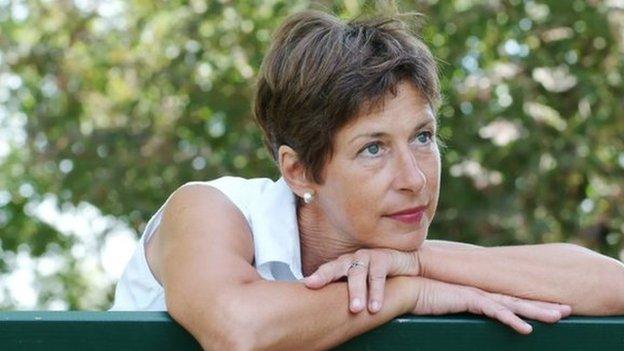Menopause treatments: HRT should be discussed more, say experts
- Published
- comments

Doctors should be more prepared to discuss hormone replacement therapy as a possible treatment for the menopause, England's health watchdog has said.
NICE urged doctors and patients to look again at potential risks and benefits of HRT, which some studies, external have linked to cancer and heart disease.
It did not say more women should use HRT, but said it could be "effective".
The health body said its report aimed to "stop women suffering in silence" from the symptoms of menopause.
In its first official guidance on the subject, NICE did not go as far as to encourage more women to use HRT but said it should not be immediately dismissed.
Risks and benefits
About 80% of women who go through the menopause experience symptoms.
And while some women need no support, NICE says others with difficult symptoms do not always get the help they need.
Looking at HRT in particular, experts said it had become a subject some women and doctors were afraid of, with some GPs overestimating the risks and some women too worried to discuss it.

Living with the menopause

HRT can come in patches or pills
Deena Mansfield, 55, from Cambridge asked for HRT to help control her symptoms but was given anti-depressants instead.
"I was told this is how we treat HRT now," she said.
"I began suffering from extreme mood swings due to a lead up to the menopause and in 2012 I had a complete breakdown, I had depression and felt suicidal.
"I am extremely embarrassed of my behaviour looking back. I had to stop work due to continual crying. I just wanted to lay in a field or throw myself in the river.
"Although the menopause is always depicted by hot flushes, it is the debilitating mood swings and loss of personality that can ruin your life.
"I wish I had pushed harder for HRT and saved myself so much grief. This would have meant my stress levels would have been much less.
"I would have been much happier and less scared and therefore much healthier and also my marriage would not have been so damaged and my children would not have seen me go so mad.
"This is a serious health issue for some women."

Prof Mary Ann Lumsden, who chairs the expert group at NICE, said: "At the moment, everyone has lost confidence in it - but we would like more confidence in explaining the treatment options, so individual women can be part of the decision making.
"What we would like is that people who need it and would benefit from it, have the option of considering it.
"There might be a bit of a rise [in people using it], there might not."
The team pointed to studies carried out in 2002 and 2003, which linked HRT to risks such as breast cancer and heart disease, and triggered a fall in prescriptions.
And while it acknowledged risks did exist, the panel said they should be weighed up in the context of benefits for each individual.

What is HRT?

After menopause, a woman's ovaries stop producing the hormone oestrogen.
HRT treats symptoms such as hot flushes, night sweats and low mood by boosting the body with more female sex hormones.
There are different types of HRT - some with oestrogen only, and others containing progesterone - each with different risks.
But exactly how big these risks are has been interpreted differently over time.
Cancer Research UK, external says if 1,000 women start taking HRT at the age of 50 for five years, two extra women get breast cancer and one more woman gets ovarian cancer.

Dr Claire Knight, Cancer Research UK's health information manager, said it was not a straightforward issue and that women should be fully involved.
She added: "We know that using hormone replacement therapy (HRT) increases the risk of developing breast, ovarian and in some cases womb cancer, but HRT can also offer effective relief from menopausal symptoms.
"What these new guidelines from NICE reiterate is that there are many factors at play in a woman's choice to use HRT or not and women need clear, evidence-based information around the risks and benefits to help them make an informed decision."
Meanwhile, Dr Imogen Shaw, a GP and member of the NICE guideline group, said: "Women should not feel they have to suffer in silence when menopause is affecting their daily lives at work and at home.
"For the last decade, some GPs have been worried about prescribing HRT, and women worried about taking it.
"I hope that this new NICE guidance will empower women to talk to their GP or practice nurse about the menopause".
'Overlooked needs'
The British Menopause Society backed the guidelines, saying they were long-awaited.
The Royal College of Obstetrics and Gynaecology also supported the report, describing it as a "milestone".
But Prof Paul Pharoah, from the University of Cambridge, called for simpler guidelines, describing some aspects as hard to understand and contradictory.
Other strategies suggested by the guidance included healthy eating, exercise and cognitive behavioural therapy for low moods.
NICE's expert panel also considered "the overlooked needs" of women under the age of 40 experiencing premature menopause and those who had menopause triggered as a result of cancer treatment.
- Published10 March 2015

- Published13 February 2015
